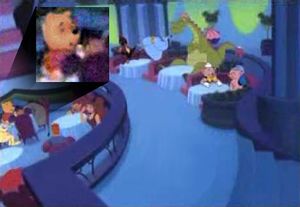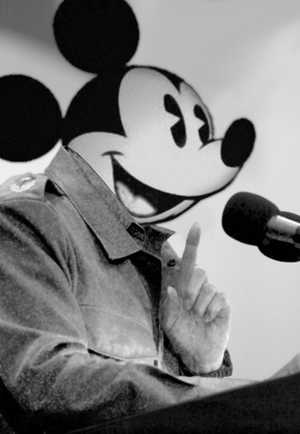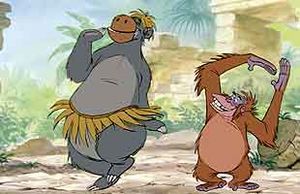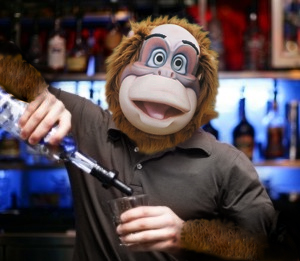House of Mouse
“The House of Mouse is like a box of chocolates, Forrest...you never know what you're gonna' get.”
“...I don't think there will ever be another venue like the House of Mouse...”
The House of Mouse is a sleazy establishment run by former President of The Peoples Republic of Castaway Cay (otherwise known as Disneyland Caribbean) Michael 'Mickey' Maus. It is located on the fittingly named Maus Boulevard, in a red-light district of the Hundred-Acre Woods on the outskirts of the city of Cape Woozle, and is well-known among such criminal underlords as Winnie the Pooh as being a place to carry out illegal activities under the authorities' nose. The club has a functioning bar, restaurant, strip club, casino, hotel, theater, and a huge series of underground warehouses used for 'storage'.
History[edit | edit source]
Maus originally conceived of such a venue during the latter parts of his presidency. In the late 60s on Castaway, the island was abuzz with talk of revolution. The living conditions were very poor, work was dangerous, and morale was low. "After a few years," Said Maus, "I began to suspect my days as Castaway's president were numbered. I saw the faces of men...terrified faces, angry faces...Disney was treating its workers with disrespect, and Disney was going to pay. I felt so scared, because I knew that I was the ringleader." In 1978, the workers of Castaway actively attacked the Disney Federation and Maus. It was a bloody conflict, most of the workers died. It was, however, not ultimately in vain. The Disney Federation was driven from the island. Management and tourists fled the island in droves, leaving the workers to govern themselves.
After the Castaway Cay Revolution of 1978, Maus escaped the island with only his life intact and retreated to the Hundred-Acre Woods to rethink it. As he regained his strength, he set out to see more of the Hundred-Acre Woods. The Hundred-Acre Woods, particularly the Cape Woozle area, was at the time a bustle of criminal activity. He saw mafia men shaking down little mom and pop stores, he saw high rollers on the streets, complaining about the lack of established recreation, he saw gangsters and druglords loading and unloading packages off the cargo planes landing in the Tri-Union "Cargo" Airport, and realized that there were "big bucks to be made, entertaining and aiding underground trade high-rollers. Such a task could be lucrative to success in both status and bond-building". In 1988, the House of Mouse was opened for business. The first members were likely the élite class of the Woozle Mafia. The House of Mouse slowly became known as a meeting place for high-rollers and mafia-men.
The House of Mouse slowly expanded, offering a buffet of luxuries and services. Maus also gained a reputation for being a thrifty businessman, ready for anything, fast acting but always ready to negotiate. Over the years, the House of Mouse became more of a nightclub/casino/luxury hotel suite, and less of a dive club. Some of the lower-status patrons who became Maus' first customers later left the House of Mouse looking for more affordable, inconspicuous venues, many of which had modeled themselves on the House of Mouse as it had existed.
In 1993, the House of Mouse underwent major renovations to "fully reach the 'raison d'être' of the House of Mouse" according to Maus. Opened again in 1995, the House of Mouse became known as the "'city hall' in the Hundred-Acre Woods' 'city of vice'". The House of Mouse, having significantly expanded in terms of space, facilities and membership, reached its 2000th member mark in 1999.
Significance[edit | edit source]
Maus has said, regarding the club, that, "the House of Mouse strives to be a cultural center for all activities...and we mean all activities." Indeed, the House of Mouse attracts a significant amount of attention from the community, as has been seen by the significant amount of visitors it receives during a typical work week. Critics have called it "an upscale Hooters" and "a major source of crime and urban decay". It is regarded by many as a "center of the community," to quote one of its most famous (or infamous) clientèle, Winston Tang-zin Pu, known abroad as Winnie the Pooh. Pooh Bear goes on to to call it "a place where all parts of the social spectrum converge as one. It is the city center, more so than the Civic Center, City Hall or YMCA. Perhaps more so than any other establishment on the face of the Earth. The same people who couldn't stand to be in the same building in ordinary day-to-day life can gladly sit together in the same room, even converse and play poker at the House of Mouse. I've seen that bridge-building myself dozens of times. This is what makes the House of Mouse so very unusual—for better or worse." It was after a rather rambunctious night at the House of Mouse that the Mad Hatter purportedly received his first DUI. Similar negative attention rocked the establishment when the Genie (labeled the second most wealthy cartoon character by Forbes Magazine)[1] engaged in a brawl with another customer and was apprehended by law enforcement officials shortly thereafter, only to get out on parole a few weeks later.
Use in the Mousepact Meetings[edit | edit source]
The House of Mouse has served as the de-facto meeting place for the so-called "Mousepact" meetings for well-over a decade. The Mousepact meetings are an annual convergence of some of the greatest suspected crimelords of the 20th and 21st centuries, including Maus himself, Pu and some of his élite gangsters and hit-men, and half-arab half-cuban now-president of Castaway Don Al Douque. It is believed by some researchers that this meeting is for the purpose of manipulating the global economy and legal-industrial complex for the long-term benefit of international crime, although what actually takes place at the meetings is well beyond the knowledge of almost all researchers.
Maus actually created a specialized meetingplace specifically and exclusively for the Mousepact meetings in 1992, dubbed "The Mouspact Room". The room boasts an entirely bullet-proof structure, a pressurized climate and gas-controlled airtight interior, gas-sensors, independent air conditioning, four weeks worth of dehydrated food, 300 gallons of water, 55 gallons of honey, 60 gallons of hunny, and other sophisticated security features.
As mentioned before, very little is known about the actual meetings, as the are the subject of remarkable secrecy. Many believe that both the 2007-2008 spike in oil-prices and the honey shortages (believed to be a product of Pooh's Operation Black Raincloud) were conceived of within the Mousepact Room at a Mousepact meeting for the gain of the members.
Controversy[edit | edit source]
The House of Mouse has gained a somewhat controversial status due to the long series of sullying scandals that have occurred there over the years.
One of these is the long history of drug deals and other criminal activities conducted on Maus' property. There have been four murders at the House. One of these was related to domestic abuse, and the other three were conducted as part of a drug deal gone wrong. (Purportedly, the local Cape Woozle Mafia and Pooh's gang were involved, but no links have come up yet proving their involvement.) Maus himself has been suggested to have ties with both the Mafia and Winnie the Pooh, but no incriminating evidence comes close to proving his involvement in any of the above crimes. Maus has responded by stating that: "here at the House of Mouse, we try our best to maintain a safe and suitable environment, an environment so suitable we wouldn't be afraid of my Grandma or, quite frankly, my Grandchildren walking in here at this very moment. It's our intention to appeal to a great diversity of tastes, but our high standards for ethical treatment of patrons and employees alike have been made clear."
An anonymous investigator visited the House of Mouse in 2001. During his visit, he uncovered a complex drug-trade network being operated partially through the House of Mouse. Later that same week, he paid an unauthorized visit to the underground warehouses, hoping to discover proof of Maus' involvement, at which point he was beaten unconscious and taken away. This is known because he was feeding this information to the Associated Press via cellular phone at the time. Experts believe he was beaten by Black Pete, one of Maus' Employees and alleged dirty-workers, who was performing inventory. The investigator has never been seen since.
Another controversy is the large amount of money that has simply "disappeared" from the paychecks of various employees of the club. Former bartender, Chuck "King" Louie, says "the House of Mouse should be held accountable for all the money that has supposedly been lost, but, as any logical man would know, has really been invested in the bank accounts of Mr. Maus and his shareholders." Louie quit his job not long after the scandal occurred, but has since vanished, never to be seen again (a crime often attributed to Winnie the Pooh). Maus maintains that "we care very deeply for our employees, and all employees abroad, and we would like to ensure they are in a fair workplace environment safe from corruption."
References[edit | edit source]
- ↑ "Fiction 500." Fortune Magazine. April 2006: 64–102. Print.





